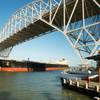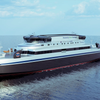U.S. Congressman Elijah E. Cummings (D-MD), Chairman of the Subcommittee on Coast Guard and Maritime Transportation, issued the following statement in response to the release of the Department of Homeland Security (DHS) Office of Inspector General's (IG) report on the 110-foot/123-foot patrol boat modernization project.
This report was developed by the DHS IG following the receipt of a Hotline Complaint alleging that the 123-foot patrol boat and the 24.6-foot prosecutor crafts designed to be launched from the 123-foot cutter and other larger cutters contained safety and security vulnerabilities due to the failure of contractors installing new equipment on the crafts to meet the requirements of the Deepwater contract. Deepwater is a series of ship and aircraft procurements expected to cost $24 billion in taxpayer dollars and require 25 years to complete.
Chairman Cummings said, "We have long known that the Coast Guard was unable to effectively oversee the Deepwater contract when the contract was implemented and that the contract was written with vague specifications that left the Coast Guard unable to enforce specific design standards or even to penalize contractors when the assets produced under Deepwater failed.
"This report lays out in specific detail how these failures can translate into the production and installation of equipment on ships that does not meet technical standards and that can actually put crew members at needless risk.
"Specifically, this report finds that contractors installing C4ISR information technology equipment aboard the 123-foot cutter failed to utilize low smoke cabling and failed to install topside equipment that could be fully operational in the rough weather conditions in which the Coast Guard regularly conducts patrols.
"In the case of the cabling, the contractor had installed substandard cabling in at least four cutters even before receiving a waiver from the Deepwater contract standards - and incorrectly self-certified compliance with the low smoke requirements. According to the DHS IG, the Coast Guard accepted the cutters with the substandard cabling - and then issued the waiver request without determining the full flammability and toxicity of the cabling then in place on the ships. In the event of an on-board fire, the use of non-low smoke cabling could have caused undue risks to the crew - risks that the Coast Guard was specifically seeking to avoid by requiring the use of low smoke cabling on the 123-foot vessels.
"This report illustrates in vivid terms that the Deepwater contract is not merely a document - and the investigation of these complaints is not merely an academic exercise. The Deepwater contract was designed to guide the construction of the assets that the men and women of the Coast Guard will rely on for decades to protect our homeland and to ensure the safety and security of maritime commerce.
"I am confident that Admiral Allen and the leadership of the Coast Guard understand the urgency of their responsibility to correct the Deepwater procurement and to ensure that all contractors working on Deepwater meet all technical standards.
"As the Admiral has often stated, our Coast Guard is more important than it has ever been - and given the threats we face, we can afford nothing less than the strongest, best-equipped Coast Guard we can possibly build.
"During his recent 'State of the Coast Guard' speech, Admiral Allen spoke in detail of his plans for transforming the Coast Guard to meet the new demands being placed on it. I appreciate his dedication and concur with his observation that it will take a 'unity of effort' to make this transformation.
Subscribe for
Maritime Reporter E-News
Maritime Reporter E-News is the maritime industry's largest circulation and most authoritative ENews Service, delivered to your Email five times per week










